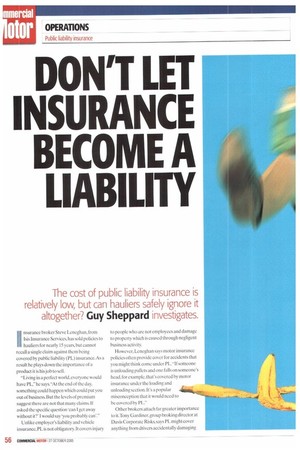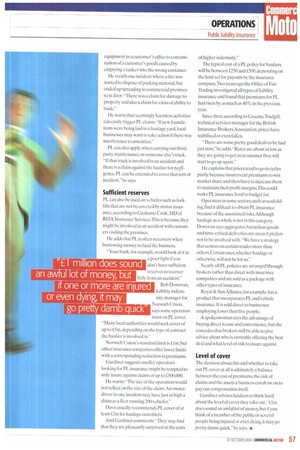DON'T LET 1 NSURANCE BECOME A LIABILITY
Page 58

Page 59

If you've noticed an error in this article please click here to report it so we can fix it.
The cost of public liability insurance is relatively low, but can hauliers safely ignore it
altogether? Guy Sheppard investigates.
Insurance broker Steve Leneghan, from Isis Insurance Services, has sold policies to hauliers for nearly 15 years, but cannot recall a single claim against them being covered by public liability (PL) insurance. As a result he plays down the importance of a product it is his job to sell.
"Living in a perfect world,everyone would have PL," he says. "Al the end of the day, something could happen which could put you out of business. But the levels of premium suggest there are not that many claims. If asked the specific question can I get away without it?' I would say'you probably can'.
Unlike employer's liability and vehicle insurance, PL is not obligatory It covers injury to people who are not employees and damage to property which is caused through negligent business activity.
However, Leneghan says motor insurance policies often provide cover for accidents that you might think con-le under PL."If someone is unloading pallets and one falls on someone's head, for example, that's covered by motor insurance under the loading and unloading section. It's a popular misconception that it would need to be covered by PL."
Other brokers attach far greater importance to it.Tony Gardiner, group broking director at Davis Corporate Risks, says PL might cover anything from drivers accidentally damaging equipment in a customer's office to contamination of a customer's goods caused by emptying a tanker into the wrong container.
He recalls one incident where a lire was started to dispose of packing material, but ended up spreading to commercial premises next door. 'There was a claim for damage to property and also a claim for a loss of ability to trade."
He warns that seemingly harmless activities can easily trigger PL claims."If new foundations were being laid in a haulage yard, local businesses may want to take action if there was interference to amenities."
PL can also apply when carrying out thirdparty maintenance on someone else's truck. "If that truck is involved in an accident and there is a claim against the haulier for negligence,PL can be extended to cover that sort of incident," he says.
Sufficient reserves PL can also be used on vehicles such as forklifts that are not be covered by motor insurance, according to Grahame Cook. MD of RHA Insurance Services.This is because they might be involved in an accident with customers visiting the premises.
He adds that PL is often necessary when borrowing money to fund the business.
"Your bank for example, would look at it in a poor light if you don't have sufficient reserves to recover fully from an accident."
Bob Donovan, liability indemnity manager for Norwich Union, says some operators insist on PL cover. "Many local authorities would seek cover of up to Om, depending on the type of contract the haulier is involved in."
Norwich Union's standard limit is £1 m, but other insurance companies offer lower limits with a corresponding reduction in premiums.
Gardiner suggests smaller operators looking for PL insurance might be tempted to only insure against claims of up to £500,000.
He warns:"The size of the operation would not reflect on the size of the claim.An ownerdriver in one incident may have just as high a claim as a fleet running 200 vehicles."
Davis usually recommends PL cover of at least Um for haulage customers.
And Gardiner cornments:"They may find that they are pleasantly surprised at the costs of higher indemnity."
The typical cost of a PL policy for hauliers will be between £250 and £500. depending on the limit set for payouts by the insurance company.Two years ago the Office of Fair Trading investigated all types of liability insurance and found that premiums for PL had risen by as much as 40% in the previous year.
Since then, according to GraemeTrudgill, technical services manager for the British Insurance Brokers Association, prices have stabilised or even fallen.
-There are some pretty good deals to be had just now," he adds."Rates are about as low as they are going to get; next summer they will start to go up again."
He explains that prices tend to go in cycles partly because insurers cut premiums to win market share and then have to increase them to maintain their profit margins.This could make PL insurance hard to budget for.
Operators in some sectors, such as scaffolding, find it difficult to obtain PL insurance because of the associated risks,Although haulage as a whole is not in this category, Donovan says aggregates, hazardous goods and time-critical deliveries are areas it prefers not to be involved with."We have a strategy that centres on certain trades more than others. Certain ones, whether haulage or otherwise, will not be for us."
Nearly all PL policies are arranged through brokers rather than direct with insurance companies and are sold as a package with other types of insurance.
Royal & Sun Alliance, for example, has a product that incorporates PL and vehicle insurance. It is sold direct to businesses employing fewer than five people.
A spokeswoman says the advantage of buying direct is ease and convenience, but she concedes that brokers will be able to give advice about who is currently offering the best deal and what level of risk to insure against.
Level of cover The decision about this and whether to take out PT, cover at all is ultimately a balance between the cost of premiums, the risk of claims and the assets a business can draw on to pay out compensation itself Gardiner advises hauliers to think hard about the level of cover they take out. "Urn does sound an awful lot of money, hut if you think of a member of the public or several people being injured or even dying, it may go pretty damn quick," he says. •










































































































































































































